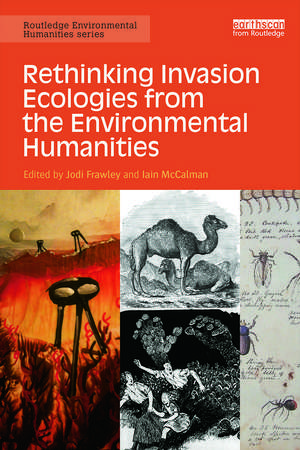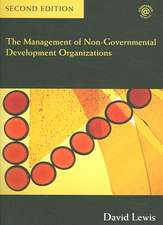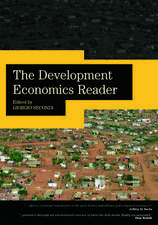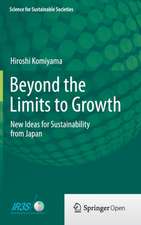Rethinking Invasion Ecologies from the Environmental Humanities: Routledge Environmental Humanities
Editat de Jodi Frawley, Iain McCalmanen Limba Engleză Paperback – 20 feb 2014
Students and researchers in environmental studies, invasion ecology, conservation biology, environmental ethics, environmental history and environmental policy will welcome this major contribution to environmental humanities.
| Toate formatele și edițiile | Preț | Express |
|---|---|---|
| Paperback (1) | 452.69 lei 6-8 săpt. | |
| Taylor & Francis – 20 feb 2014 | 452.69 lei 6-8 săpt. | |
| Hardback (1) | 1002.63 lei 6-8 săpt. | |
| Taylor & Francis – 14 apr 2014 | 1002.63 lei 6-8 săpt. |
Din seria Routledge Environmental Humanities
-
 Preț: 295.40 lei
Preț: 295.40 lei -
 Preț: 289.51 lei
Preț: 289.51 lei -
 Preț: 302.45 lei
Preț: 302.45 lei -
 Preț: 303.87 lei
Preț: 303.87 lei -
 Preț: 294.99 lei
Preț: 294.99 lei -
 Preț: 288.41 lei
Preț: 288.41 lei -
 Preț: 386.31 lei
Preț: 386.31 lei -
 Preț: 340.64 lei
Preț: 340.64 lei -
 Preț: 281.14 lei
Preț: 281.14 lei -
 Preț: 311.41 lei
Preț: 311.41 lei -
 Preț: 280.72 lei
Preț: 280.72 lei -
 Preț: 369.99 lei
Preț: 369.99 lei -
 Preț: 288.72 lei
Preț: 288.72 lei -
 Preț: 303.87 lei
Preț: 303.87 lei -
 Preț: 326.78 lei
Preț: 326.78 lei -
 Preț: 311.41 lei
Preț: 311.41 lei -
 Preț: 288.37 lei
Preț: 288.37 lei -
 Preț: 191.93 lei
Preț: 191.93 lei -
 Preț: 347.73 lei
Preț: 347.73 lei - 18%
 Preț: 1050.78 lei
Preț: 1050.78 lei - 20%
 Preț: 1046.91 lei
Preț: 1046.91 lei - 28%
 Preț: 821.14 lei
Preț: 821.14 lei -
 Preț: 446.53 lei
Preț: 446.53 lei - 18%
 Preț: 1001.84 lei
Preț: 1001.84 lei -
 Preț: 441.74 lei
Preț: 441.74 lei - 26%
 Preț: 850.17 lei
Preț: 850.17 lei - 18%
 Preț: 1001.84 lei
Preț: 1001.84 lei -
 Preț: 369.95 lei
Preț: 369.95 lei -
 Preț: 415.24 lei
Preț: 415.24 lei - 18%
 Preț: 1001.07 lei
Preț: 1001.07 lei - 18%
 Preț: 1054.71 lei
Preț: 1054.71 lei - 18%
 Preț: 1000.87 lei
Preț: 1000.87 lei - 26%
 Preț: 819.09 lei
Preț: 819.09 lei - 18%
 Preț: 1171.19 lei
Preț: 1171.19 lei - 18%
 Preț: 1000.27 lei
Preț: 1000.27 lei - 16%
 Preț: 277.74 lei
Preț: 277.74 lei - 18%
 Preț: 1000.27 lei
Preț: 1000.27 lei -
 Preț: 403.91 lei
Preț: 403.91 lei - 15%
 Preț: 297.57 lei
Preț: 297.57 lei - 18%
 Preț: 1002.63 lei
Preț: 1002.63 lei - 18%
 Preț: 1053.16 lei
Preț: 1053.16 lei - 13%
 Preț: 297.99 lei
Preț: 297.99 lei - 18%
 Preț: 1004.20 lei
Preț: 1004.20 lei
Preț: 452.69 lei
Nou
Puncte Express: 679
Preț estimativ în valută:
86.62€ • 90.26$ • 71.72£
86.62€ • 90.26$ • 71.72£
Carte tipărită la comandă
Livrare economică 03-17 aprilie
Preluare comenzi: 021 569.72.76
Specificații
ISBN-13: 9780415716574
ISBN-10: 0415716578
Pagini: 288
Ilustrații: black & white illustrations, figures
Dimensiuni: 156 x 234 x 30 mm
Greutate: 0.53 kg
Ediția:1
Editura: Taylor & Francis
Colecția Routledge
Seria Routledge Environmental Humanities
Locul publicării:Oxford, United Kingdom
ISBN-10: 0415716578
Pagini: 288
Ilustrații: black & white illustrations, figures
Dimensiuni: 156 x 234 x 30 mm
Greutate: 0.53 kg
Ediția:1
Editura: Taylor & Francis
Colecția Routledge
Seria Routledge Environmental Humanities
Locul publicării:Oxford, United Kingdom
Public țintă
PostgraduateCuprins
Part 1 SETTING THE SCENE 1. Ecologies: the nature/culture challenge Part 2 INVASION AND THE ANTHROPOCENE 2. Back Story: Migration, Assimilation, and Invasion in the Nineteenth Century 3. Fragments for a Postcolonial Critique of the Anthropocene: Invasion Biology and Environmental Security 4. Resilience in the Anthropocene: A Biography 5. Landscapes of the Anthropocene: from dominion to dependence? Part 3 EVERDAY LIFE IN INVASION ECOLOGIES 6. Living in a weedy future: insights from the garden 7. Experiments in the rangelands: white bodies and native invaders 8. Thorny problems: Industrial pastoralism and managing ‘country’ in Northwest Queensland, Australia Part 4 ECOLOGICAL POLITICS OF IMAGINING OTHERWISE 9. Prickly Pears and Martian Weeds: Ecological Invasion Narratives in the History and Fiction 10. Cane Toads: Animality And Ecology In Mark Lewis’s Documentary Films 11. Wolvogs, Pigoons and Crakers—Invasion of the Bodysplices in Margaret Atwood’s Oryx and Crake Part 5 UNRULY NATIVES AND EXOTICS 12. Invasion ontologies: venom, visibility and the imagined histories of arthropods 13. Naturalising Australian Trees in South Africa: Climate, Exotics and Experimentation 14. Remaking wetlands: rice fields and ducks in the Murrumbidgee River region, NSW 15.Invasion of the crocodiles
Notă biografică
Jodi Frawley is a Discovery Early Career Researcher Award Fellow in the Department of Gender and Cultural Studies, University of Sydney, Australia.
Iain McCalman is a Professorial Research Fellow in History, University of Sydney. He is Co-Director of the new Sydney University Environment Institute, Australia.
Iain McCalman is a Professorial Research Fellow in History, University of Sydney. He is Co-Director of the new Sydney University Environment Institute, Australia.
Recenzii
We know enough about the ecology of many invasive species to inform management that would make a huge difference. Around the world, the stumbling block is not so much the shortage of knowledge on what to do, it is ways of getting around the many complexities of the human dimensions of biological invasions. This book provides a crucial advance in this direction
–David M. Richardson, Stellenbosch University, South Africa
If Charles Elton's classic, The Ecology of Invasions, changed forever the way we thought about plants and animals, so too Frawley and McCalman's book is a major turning point. Rethinking Invasion Ecologies is a bold set of essays. Assimilation, migration, resilience, habitat, natives – all the conceptual ground that ecology, history and politics share is incisively explored. From crocodiles to humans, cane toads to prickly pears, in new worlds and old, this is environmental humanities at its sharpest.
–Alison Bashford, University of Cambridge, UK
This exciting, timely and important collection illuminates the complex range of human values and actions that emerge from multi-disciplinary reflection. Often construed as relevant only to biologists, by adapting a cultural and historical perspective the innovative scholarship ofRethinking Invasion Biologies from the Environmental Humanitiesreframes and reconceptualises the entangled, contradictory and ambiguous relationships between people and unruly biota.
–Jane Carruthers, University of South Africa, South Africa
This book demonstrates the value of the current turn to interdisciplinary approaches within a world transformed by colonial and postcolonial connections. Seeing human, plant and animal mobilities as thoroughly intertwined products of the Anthropocene, it innovatively bridges nature and culture and merges environmental, cultural and political histories.
–Alan Lester, University of Sussex, UK
With pieces ranging from a biography of the concept of resilience to case studies of our reactions to cane toads,Latrodectusspiders, and salt-water crocodiles, this book argues the humanities have much to contribute to discussions of the Anthropocene. It makes a strong case, and its emphasis on Australia adds, for the rest of us, another voice to the dialogue. A fine collection on a fascinating and timely topic.
–Thomas R. Dunlap, Texas A&M University, USA
–David M. Richardson, Stellenbosch University, South Africa
If Charles Elton's classic, The Ecology of Invasions, changed forever the way we thought about plants and animals, so too Frawley and McCalman's book is a major turning point. Rethinking Invasion Ecologies is a bold set of essays. Assimilation, migration, resilience, habitat, natives – all the conceptual ground that ecology, history and politics share is incisively explored. From crocodiles to humans, cane toads to prickly pears, in new worlds and old, this is environmental humanities at its sharpest.
–Alison Bashford, University of Cambridge, UK
This exciting, timely and important collection illuminates the complex range of human values and actions that emerge from multi-disciplinary reflection. Often construed as relevant only to biologists, by adapting a cultural and historical perspective the innovative scholarship ofRethinking Invasion Biologies from the Environmental Humanitiesreframes and reconceptualises the entangled, contradictory and ambiguous relationships between people and unruly biota.
–Jane Carruthers, University of South Africa, South Africa
This book demonstrates the value of the current turn to interdisciplinary approaches within a world transformed by colonial and postcolonial connections. Seeing human, plant and animal mobilities as thoroughly intertwined products of the Anthropocene, it innovatively bridges nature and culture and merges environmental, cultural and political histories.
–Alan Lester, University of Sussex, UK
With pieces ranging from a biography of the concept of resilience to case studies of our reactions to cane toads,Latrodectusspiders, and salt-water crocodiles, this book argues the humanities have much to contribute to discussions of the Anthropocene. It makes a strong case, and its emphasis on Australia adds, for the rest of us, another voice to the dialogue. A fine collection on a fascinating and timely topic.
–Thomas R. Dunlap, Texas A&M University, USA
Descriere
Research from a uniquely humanist perspective has much to offer in interrogating the social and cultural ramifications of invasion ecologies. This book addresses the ongoing community concerns about invasive species and the ecological changes that we will together face in a climate changing world. It demonstrates beautifully how the environmental humanities can meaningfully impact discourse on environmental degradation. It allows us to rethink what has been a longstanding problem in global environmental history: the impact on national, regional or local ecologies of the deliberate or accidental introduction of foreign species, plant and animal. The book reveals how the nonhuman world must be examined in conjunction with cultural and historical processes. Particularly important is how it examines the prejudice toward nativism in much supposedly neutral environmental and ecological writing.









